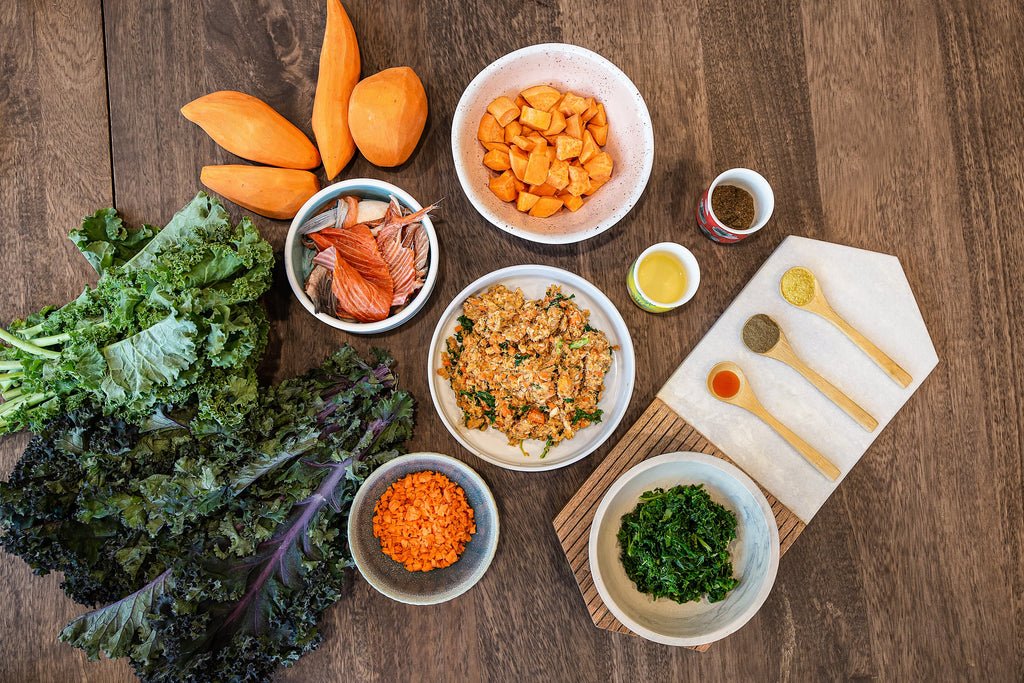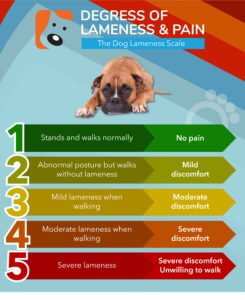To enhance homemade dog food, consider adding omega-3 fatty acids, probiotics, and a multivitamin designed for dogs. These supplements support overall health and nutrition. What Supplements Should I Add to Homemade Dog Food?
Creating homemade dog food can be rewarding, but ensuring it meets your pet’s nutritional needs is crucial. Dogs require a balanced diet that includes protein, carbohydrates, fats, vitamins, and minerals. While fresh ingredients provide many nutrients, supplements can fill any gaps.
Some key supplements, like omega-3 fatty acids, promote healthy skin and a shiny coat. Probiotics support digestive health, while multivitamins ensure your dog receives essential micronutrients. Always consult your veterinarian before introducing new supplements to your dog’s diet. This ensures your furry friend receives optimal nutrition tailored to their specific needs and health conditions.
Table of Contents
Introduction To Homemade Dog Food
Making homemade dog food gives you control over your pet’s diet. It allows you to choose quality ingredients and avoid harmful additives. Many pet owners opt for this option to ensure their dogs receive the best nutrition.
Benefits Of A Homemade Diet
Homemade dog food offers several advantages:
- Quality Control: Select fresh, high-quality ingredients.
- Customizable Recipes: Tailor meals to your dog’s specific needs.
- Allergy Management: Avoid common allergens in commercial foods.
- Better Digestion: Fresh ingredients can improve gut health.
- Improved Coat Condition: Quality fats and proteins enhance fur shine.
Key Nutritional Needs
Your dog requires a balanced diet. Key nutritional components include:
| Nutrient | Function | Sources |
|---|---|---|
| Protein | Supports muscle and tissue health. | Chicken, beef, fish, eggs |
| Carbohydrates | Provides energy. | Brown rice, sweet potatoes, oats |
| Fats | Supports skin and coat health. | Fish oil, flaxseed oil, chicken fat |
| Vitamins | Boosts immune function. | Fruits, vegetables, supplements |
| Minerals | Supports bone and teeth health. | Bone meal, leafy greens |
Each nutrient plays a vital role. Balancing these components is crucial for your dog’s health.

Credit: www.youtube.com
The Role Of Supplements In A Dog’s Diet
Supplements play a vital role in a dog’s nutrition. Homemade dog food may lack essential nutrients. Supplements help fill these gaps. A balanced diet keeps your dog healthy and energetic.
Balancing Nutrients
A dog’s diet needs a mix of proteins, fats, vitamins, and minerals. Homemade meals can miss some of these. Supplements ensure your dog gets what it needs.
- Proteins: Vital for muscle growth and repair.
- Fats: Provide energy and support skin health.
- Vitamins: Aid in various body functions.
- Minerals: Important for bone health and enzymatic processes.
Consider using supplements to balance nutrients in homemade dog food. This helps prevent health issues.
Common Deficiencies In Homemade Meals
Homemade dog food may lack certain nutrients. Here are common deficiencies:
| Nutrient | Symptoms of Deficiency |
|---|---|
| Calcium | Weak bones, dental issues |
| Omega-3 Fatty Acids | Poor coat condition, inflammation |
| Vitamin E | Muscle weakness, immune issues |
| Vitamin A | Poor vision, skin problems |
Using the right supplements can prevent these deficiencies. Always consult your vet before adding any supplements. They can suggest the best options for your dog’s needs.
Essential Supplements For Your Dog
Homemade dog food can be healthy and delicious. However, it may lack some essential nutrients. Adding supplements ensures your dog gets a balanced diet. Here are two crucial supplements to consider.
Multivitamins: A Safety Net
Multivitamins act as a safety net for your dog’s health. They fill nutritional gaps that homemade food might miss. A good multivitamin contains:
- Vitamins A, C, D, E, and K
- B vitamins for energy
- Minerals like calcium and phosphorus
- Antioxidants for immune support
Choose a multivitamin designed for dogs. Consult your vet for the right dosage. Look for high-quality brands. Avoid human multivitamins; they can harm dogs.
Omega-3 Fatty Acids: For Healthy Coats And Skin
Omega-3 fatty acids are vital for your dog’s health. They promote a shiny coat and healthy skin. Benefits include:
- Reducing inflammation
- Improving heart health
- Enhancing cognitive function
Sources of Omega-3 include:
| Source | Benefits |
|---|---|
| Fish oil | Rich in EPA and DHA |
| Flaxseed oil | Plant-based Omega-3 |
| Chia seeds | High in fiber and nutrients |
Always consult your vet before adding Omega-3 supplements. They can recommend the best options for your dog.
Protein Supplements
Protein is essential for your dog’s health. It supports growth, muscle development, and overall well-being. Adding the right protein supplements to homemade dog food can enhance nutrition.
Animal Vs. Plant-based Proteins
Choosing the right protein source is crucial. Here’s a comparison:
| Type of Protein | Benefits | Sources |
|---|---|---|
| Animal Protein |
|
|
| Plant-Based Protein |
|
|
How Much Is Too Much?
Finding the right protein amount is vital. Too much protein can harm your dog’s health. Follow these guidelines:
- Adult dogs need about 18-25% protein.
- Puppies require 22-32% protein for growth.
- Monitor your dog’s weight and energy levels.
Consult your veterinarian for personalized advice. They can recommend the best protein sources and amounts for your dog. Balance is key to a healthy diet.
Calcium: A Critical Component
Calcium is vital for your dog’s health. It supports strong bones and teeth. It also aids in muscle function and nerve transmission. Homemade dog food needs the right amount of calcium. Too little or too much can cause health issues.
Sources Of Calcium
Choosing the right sources of calcium is crucial. Here are some excellent options:
- Crushed eggshells: One eggshell provides about 2,000 mg of calcium.
- Bone meal: This powder contains a good amount of calcium.
- Fish: Sardines and salmon are great sources.
- Dairy products: Yogurt and cheese can provide calcium.
- Dark leafy greens: Kale and spinach are beneficial too.
Calculating The Right Amount
Determining the correct calcium amount is essential. The general guideline is:
| Dog’s Weight | Calcium Requirement (Daily) |
|---|---|
| 10 lbs | 200 mg |
| 20 lbs | 400 mg |
| 30 lbs | 600 mg |
| 40 lbs | 800 mg |
| 50 lbs | 1,000 mg |
Use the table above to find the right amount for your dog. Monitor their health regularly. Adjust the calcium levels as needed. Always consult your vet before making any changes.

Credit: www.amazon.com
Joint Health: Glucosamine And Chondroitin
Maintaining your dog’s joint health is crucial. Supplements like Glucosamine and Chondroitin can provide essential support. These ingredients help keep joints healthy and functioning well.
Benefits For Aging Dogs
Aging dogs often face joint issues. Glucosamine and Chondroitin can help in several ways:
- Reduces Pain: They ease discomfort from arthritis.
- Improves Mobility: Dogs move more freely and with less pain.
- Supports Cartilage: They help maintain joint structure.
- Enhances Quality of Life: Active dogs are happier dogs.
Recommended Dosages
Proper dosage is vital for effectiveness. Here are general guidelines:
| Dog Weight | Glucosamine (mg) | Chondroitin (mg) |
|---|---|---|
| Up to 10 lbs | 250 mg | 200 mg |
| 11 to 30 lbs | 500 mg | 400 mg |
| 31 to 60 lbs | 1000 mg | 800 mg |
| 61 lbs and over | 1500 mg | 1200 mg |
Consult your vet before starting any supplement. They can recommend the best dosage for your dog’s needs.
Probiotics And Digestive Health
Probiotics are live bacteria. They help keep your dog’s gut healthy. Adding probiotics to homemade dog food can enhance digestive health. They improve nutrient absorption and boost the immune system. Healthy digestion leads to a happier, more active dog.
Improving Gut Health
Healthy gut flora is vital for your dog’s well-being. Probiotics can:
- Reduce diarrhea and constipation.
- Minimize gas and bloating.
- Enhance nutrient absorption.
- Support a strong immune system.
Consider these benefits when choosing probiotics for your dog’s food. A healthy gut leads to a healthy dog.
Choosing The Right Probiotics
Selecting the right probiotics is essential. Look for these factors:
| Factor | Description |
|---|---|
| Strain Variety | Choose multiple strains for better results. |
| CFU Count | Look for at least 1 billion CFUs per serving. |
| Form | Powder, capsule, or chewable options are available. |
| Quality | Choose products from reputable brands. |
Consult with your vet before adding probiotics. They can recommend the best options for your dog’s needs.

Credit: www.amazon.com
Customizing Supplements For Your Dog
Creating homemade dog food means you can control your dog’s diet. Customizing supplements is essential. Each dog has unique needs based on age, health, and lifestyle. Let’s explore how to tailor supplements for your furry friend.
Special Needs: Puppies Vs. Seniors
Puppies and senior dogs have different nutritional requirements. Understanding these needs helps you choose the right supplements.
| Age Group | Key Nutrients | Recommended Supplements |
|---|---|---|
| Puppies | Calcium, Protein, DHA | Fish Oil, Calcium Supplements |
| Seniors | Glucosamine, Antioxidants | Joint Supplements, Vitamin E |
Puppies need extra protein for growth. DHA supports brain development. Calcium is vital for bone strength. Senior dogs benefit from joint health supplements. Antioxidants help reduce aging effects.
Allergies And Sensitivities
Some dogs have allergies or sensitivities. Identifying these issues is crucial for their health. Choose supplements carefully.
- Common Allergens:
- Grains
- Dairy
- Beef
- Poultry
- Recommended Supplements:
- Fish Oil for skin health
- Probiotics for gut health
- Digestive enzymes for better nutrient absorption
Always consult your vet before adding supplements. Monitor your dog for any reactions. Tailoring supplements ensures your dog stays healthy and happy.
Monitoring Your Dog’s Health
Keeping a close watch on your dog’s health is vital. Homemade dog food can provide excellent nutrition. However, it may lack some essential nutrients. Monitoring helps you ensure your dog gets everything needed for a healthy life.
Signs Of Nutritional Imbalance
Watch for these signs of nutritional imbalance:
- Weight Loss: Unintentional weight loss can indicate poor nutrition.
- Dry Skin: Flaky or itchy skin may suggest a lack of fatty acids.
- Low Energy: A drop in energy levels can signal inadequate vitamins.
- Digestive Issues: Vomiting or diarrhea may point to dietary problems.
- Poor Coat Condition: A dull or greasy coat often reflects nutrition deficiencies.
Regularly monitor your dog for these signs. Early detection can prevent serious health issues.
When To Consult A Vet
Consult a veterinarian if you notice:
- Persistent Symptoms: If issues last more than a few days.
- Sudden Changes: Any rapid change in behavior or appetite.
- Severe Weight Loss: If your dog loses weight quickly.
- Unusual Symptoms: Symptoms like lethargy or excessive scratching.
Regular vet check-ups are essential. They can assess your dog’s overall health and adjust the diet as needed.
Conclusion: A Balanced Approach
Creating homemade dog food requires careful planning. It’s essential to ensure your dog gets all necessary nutrients. Supplements can enhance your dog’s diet. A balanced approach leads to a healthy, happy pet.
Recap Of Key Points
- Essential Nutrients: Dogs need proteins, fats, vitamins, and minerals.
- Common Supplements: Consider adding fish oil, probiotics, and calcium.
- Consult a Vet: Always check with your veterinarian before adding supplements.
- Monitor Health: Watch for any changes in your dog’s behavior or health.
Continued Learning And Adaptation
Dog nutrition is an evolving field. Stay updated on the latest research. Adjust your dog’s diet as needed. Here are some ways to continue learning:
- Read reputable pet nutrition books.
- Follow trusted veterinary blogs and websites.
- Join online forums about dog nutrition.
- Attend workshops or webinars on pet care.
Adapting your dog’s diet helps maintain their health. Always observe how your dog responds to changes. A healthy dog is a happy dog.
Frequently Asked Questions
What Nutrients Do Homemade Dog Food Supplements Provide?
Supplements for homemade dog food provide essential vitamins, minerals, and fatty acids. They ensure your dog receives a balanced diet. Key nutrients include Omega-3 for skin health and calcium for strong bones. Using supplements can help fill any nutritional gaps in your dog’s homemade meals.
How Do I Choose The Right Supplements?
Choosing the right supplements involves assessing your dog’s dietary needs. Consider factors like age, breed, and health conditions. Consult with a veterinarian for personalized recommendations. Look for high-quality, reputable brands that meet AAFCO standards. Always introduce new supplements gradually to monitor for any adverse reactions.
Can I Use Human Supplements For My Dog?
Using human supplements for dogs is generally not advisable. Many human supplements contain ingredients that can be harmful to dogs. Dosages may also differ significantly between humans and pets. Always opt for supplements specifically formulated for dogs to ensure safety and effectiveness.
How Much Supplement Should I Add?
The amount of supplement to add depends on the product and your dog’s size. Follow the dosage instructions on the supplement label. A veterinarian can provide tailored advice based on your dog’s specific needs. Start with smaller amounts to monitor your dog’s response before adjusting.
Conclusion
Creating homemade dog food can be rewarding. Ensuring your dog gets the right nutrients is essential. Adding the right supplements helps support their health. Always consult your vet before making changes. With the right ingredients and care, your furry friend can thrive on a balanced diet.
Happy cooking for your pup!



